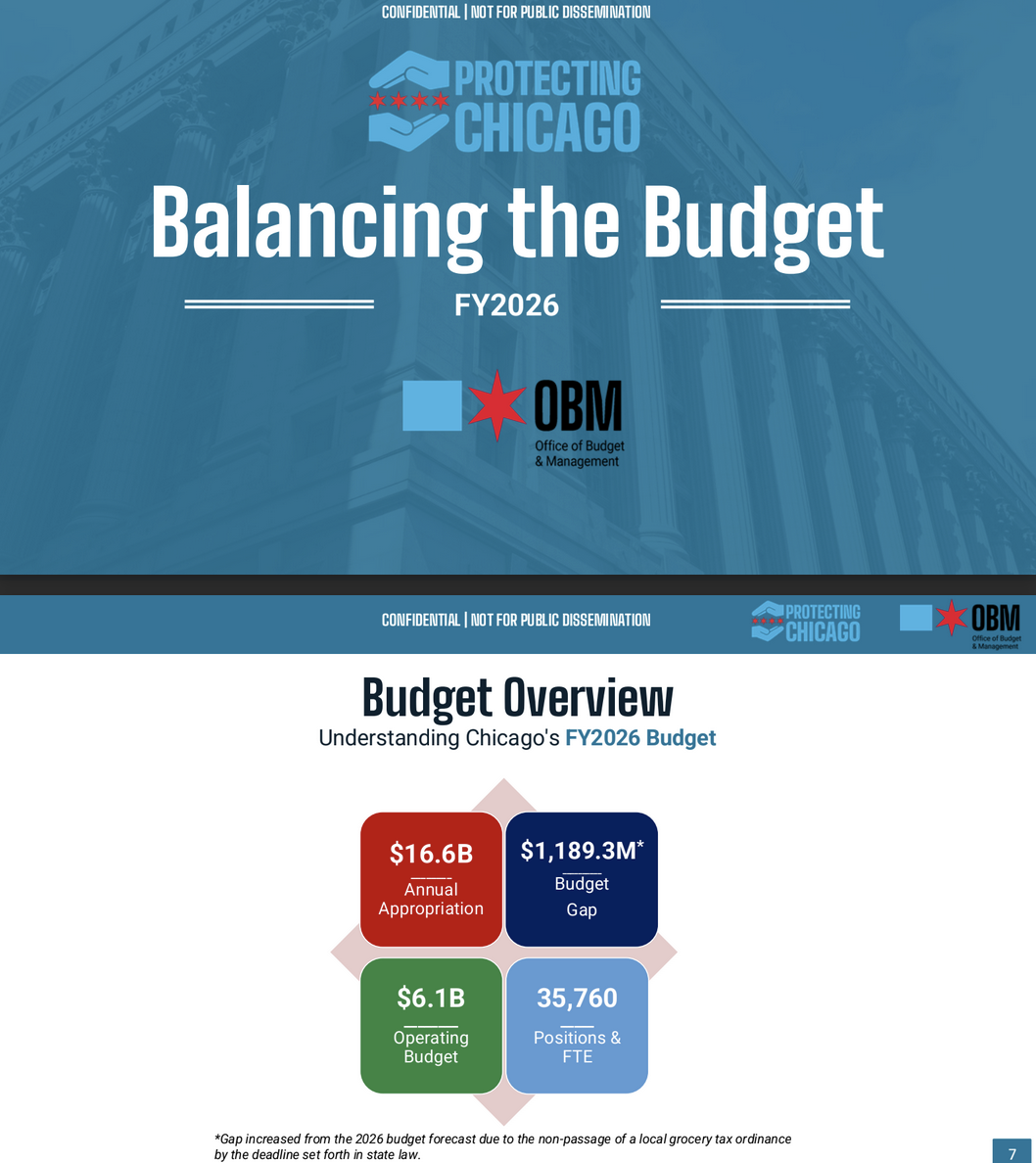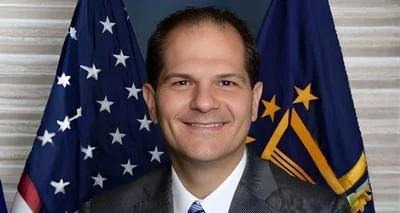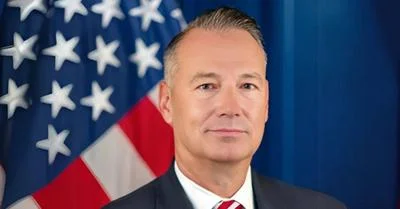Chicago Mayor Brandon Johnson unveils his proposed $16.6B FY2026 budget, which targets corporations while leaving the police department underfunded. | Facebook / Brandon for Chicago
Chicago Mayor Brandon Johnson unveils his proposed $16.6B FY2026 budget, which targets corporations while leaving the police department underfunded. | Facebook / Brandon for Chicago
A leaked FY2026 budget proposal from Mayor Brandon Johnson outlines plans for new taxes and employee surcharges on corporations and luxury industries to close the city’s $1.2 billion deficit.
The 40-slide document was shared with Chicago City Wire by an anonymous source.
See the slide deck HERE.
Marked "Confidential | Not for Public Dissemination" and issued by the Mayor's Office of Management and Budget, the leak comes just weeks after Johnson's Oct. 16 budget address to the City Council.
Johnson is expected to formally introduce the plan in the coming weeks.
With the city's departmental hearings wrapping Nov. 13 and Finance Committee sessions on the 17th, the City Council is slated for votes on Nov. 18 and 20, potentially with veto overrides on the 28th.
"While Mayor Johnson presents his annual budget as ‘protecting Chicago,’ the spending plan is just more progressive gamesmanship,” a political insider told Chicago City Wire. “The budget proposes a raft of new taxes which the mayor claims will only affect the highest income earners in the city. A fantasy, the new taxes will never raise the revenue sought and are likely to hobble job growth.”
Notably, Johnson is expected to declare TIF surpluses totaling $1 billion with $500 million pledged to the Chicago Public Schools to plug a hole in its budget, like he did in 2024.
Prior to becoming mayor, Johnson was a lobbyist and union organizer, working for the Chicago Teachers Union, which raised millions of dollars from its members to support Johnson's campaign coffers.
“Worse, Johnson's budget is a grand bargain with the Chicago Public Schools, which through the looting of TIFs, will receive $500M in TIF surplus which otherwise would have been delivered to development projects throughout the city,” the insider said. “This budget is one big payoff to the mayor's overlords at the Chicago Teachers Union."
At the heart of the FY2026 blueprint titled "Protecting Chicago Budget," is the nearly $1.19 billion budget gap, worsened by $98 million from the sunsetting of local grocery taxes, forcing a $16.6 billion total appropriation, down 3.2% or $547.9 million from FY2025.

Leaked FY2026 budget slides show corporate taxes, employee surcharges and a $98M police shortfall amid rising Chicago crime.
Notably, as of 2024 the City of Chicago had spent nearly $300 million addressing the illegal immigrant crisis that began in 2022, with more than 11,200 illegal immigrants living in city shelters.
Key revenue measures in the proposed budget include a Community Safety Surcharge of $21 per employee per month for companies with 100 or more workers, exempting nonprofits and part-time employees. Fellow Democrats have come out against such an “employee surcharge” saying it will provide disincentives for employers to create more employment in the city.
The budget also calls for an increase in the Personal Property Lease Transaction (PPLT) tax from 11% to 14% on leased equipment, expected to generate $333 million annually, largely from tech giants such as Microsoft and Amazon.
“Currently set at 11%, with a proposed increase to 14%, projected to generate an additional $230 million annually Tech firms like Microsoft and Amazon have increasingly become the top taxpayers,” the slide deck reads.
Additionally, the S.M.A.R.T. Tax imposes a $0.50 monthly fee per active social media user, projected to raise $31 million for mental health clinics.
“Proposal utilizes Chicago's existing Amusement Tax Authority to levy a first-of-its-kind tax on social media companies,” the slide deck reads.
Other revenue measures include a 10.25% extension of the online sports wagering tax.
“In 2021, the City passed an ordinance imposing a 2% tax on in-person sports wagering,” the slide deck reads. “In the first year of collections (2024), the city collected $20,568 in revenue. The city’s tax does not extend to online sports wagering – which is where most wagers are placed. Illinois Gaming Board’s 2024 data shows that 98% of all sports wagering took place online.”
Additionally, a $2-per-unit hemp regulatory tax, expanded congestion surcharges on rideshares, a yacht moorage tax increase and higher fees on vacant buildings owned by financial institutions.
On the spending side, the $6.1 billion operating budget supports 35,760 positions but includes structural cuts such as a targeted hiring freeze of $50 million, non-personnel expense reductions of $90 million, overtime caps of $43 million and position shifts of $10 million.
The plan earmarks billions for politicized initiatives framed around “equity,” “environment” and social programs, while the Chicago Police Department (CPD) faces a $98 million shortfall, hiring freezes and thousands of unfilled positions.
Phase II “civilianization” of CPD roles is projected to save $100 million over 10 years. Yet, roughly 2,000 police positions remain unfilled.
This dynamic occurs as Chicago saw a rise in violent crime in 2024, with 28,443 incidents reported, including aggravated assaults hitting a 20-year high. Meanwhile, overall violent crime has been trending upward for the past decade.
Arrests remain low, with only about 1 in 7 violent crimes resulting in an arrest, though aggravated battery arrests improved to 1 in 5. The majority of violent incidents, especially aggravated batteries, occurred on the West and South Sides, with neighborhoods like Englewood and Austin most heavily affected.
The budget also provides for partial advance pension payment of $120.2 million, down from previous years, while debt service for infrastructure and settlements is projected to rise but will be spread over multiple years to ease annual payments.
Johnson is also seeking to offset potential federal funding losses after the Department of Homeland Security (DHS) and FEMA tied disaster relief grants to the city certifying that it does not operate diversity, equity and inclusion programs.
The move comes amid a lawsuit filed by the Johnson administration, which argues the federal government lacks authority to impose such “arbitrary and capricious” conditions.
Meanwhile, the Trump administration has portrayed DEI initiatives as inherently racist, claiming they lower standards and favor hiring or promotions based on race, gender, or disability rather than merit.
Overall, the administration has positioned DEI as a form of racial favoritism that undermines meritocracy and misuses taxpayer dollars.






 Alerts Sign-up
Alerts Sign-up